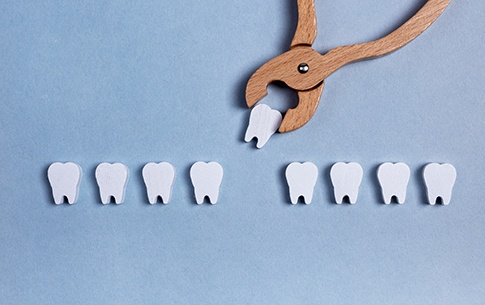Tooth Extractions – Conway, SC
Necessary Treatment to Save Your Smile
Every day, we take the necessary steps to keep smiles healthy. Most of the time, this means cleaning, saving, and restoring natural teeth however we can; we consider every option before turning to the last resort—extraction. Sometimes, however, the best treatment option is removing a tooth entirely to preserve the other teeth or your well-being. If Dr. Murph recommends extracting a tooth, he will take time to explain the reasons behind it, and our team at American Dental Care will walk you through the entire process and will help you feel comfortable. Do you need to have a tooth or two removed? Contact us to schedule your appointment to get started today with necessary tooth extractions in Conway, SC.
Why Choose American Dental Care for Tooth Extractions?
- Dental Implant Placement Handled In-House
- Nitrous Oxide Sedation Offered
- High-Quality, Custom Tooth Replacement Options
Types of Tooth Extractions

Although dental implants come pretty close, nothing can fully replace a natural tooth, which is why we work so hard to save your real tooth structure. However, there are situations where extraction becomes necessary, including the following:
- Severe gum disease.
- Advanced decay that could spread to other teeth.
- Impacted wisdom teeth.
- Primary teeth that haven’t come out on their own and are interfering with permanent teeth.
- Impacted or infected wisdom teeth.
- Preparation for orthodontic treatment when the teeth are overcrowded.
The Tooth Extraction Process

Once you and Dr. Murph have decided that extraction is the right treatment choice for you, we can start the procedure by administering anesthesia to numb the area. Depending on the location and type of the tooth, we’ll remove it by simply pulling it or breaking it into smaller pieces. If necessary, such as in the case of wisdom teeth, we can also go under the gums’ surface to extract troubled teeth. After all, Dr. Murph is experienced and highly trained in oral surgery. Whatever method we use, you can be certain that you will feel comfortable throughout the entire process.
Post-Operative Care

The way you handle the aftermath of the surgery greatly affects how well and how quickly you heal from your extraction procedure. We will apply gauze to the site after we finish the surgery, and the bleeding may continue for a while, so you will need to change it when it is soaked. If the bleeding doesn’t stop after 24 hours, give our dental office a call.
After you are driven home by a family member or friend, be sure to rest, but don’t lie flat. Use a pillow to prop your head up when you lie down. To control swelling, apply a cold compress for 10-minute intervals. If you experience pain, you can take pain medication as directed by Dr. Murph.
For a few days after your surgery, you will need to stick to a diet of soft food. Some recommended foods include gelatin, mashed potatoes, pudding, yogurt, ice cream, thin soups, and more. Slowly work back toward a normal diet, careful to avoid the surgical site when chewing.
During this initial phase, make sure you do not use a straw with drinks or smoke. The sucking motion can slow the clotting process and loosen your sutures. If you have prolonged pain, bleeding, or irritation, or don't feel that the extraction site is healing as it should, feel free to call us.
Understanding the Cost of Tooth Extractions

While our team does everything we can to save your natural teeth, in certain cases, the best decision for your oral health may be to have a severely damaged or decayed tooth removed. Before moving forward with the procedure, our team will outline all of your options for you, including having the tooth replaced, along with walking you through a detailed cost estimate. Based on this, you can decide to move forward with your tooth extraction in Conway with confidence.
Factors That Affect the Cost of Tooth Extractions

The cost of your tooth extraction will be based on a number of factors that will be unique to your dental case, including:
- How Many Teeth Need to Be Extracted: The more teeth you need to have removed, the more costly your procedure will likely be.
- Whether the Extracted Teeth Will Be Replaced: If a tooth is being extracted due to crowding, you may not need to have it replaced. However, if it’s being removed due to dental damage or an oral health problem, we highly recommend having it replaced as soon as possible to minimize your risk of developing other oral health problems down the road.
- The Type of Extraction Needed: There are two types of extractions, surgical and non-surgical. Due to Murph’s extensive training and experience, he’s able to complete most extractions in-office to help his patients avoid needing to be referred to a specialist.
- The Location of the Tooth Needing to Be Extracted: Molars can be more complicated to extract and are harder to reach, leading to a more costly procedure.
- Whether You Require Dental Sedation: While some patients may not require sedation, those who are nervous, anxious, or who could otherwise benefit from dental sedation like nitrous oxide, may decide to take on this additional fee.
Does Dental Insurance Cover Tooth Extractions?

If you’re unsure of whether your dental insurance plan covers the cost of a tooth extraction, we recommend contacting them before your treatment if possible. Because every plan’s coverage varies, it’s difficult to say whether yours will reimburse you for the expense. At the time of service, we do ask that all expenses be paid, and our team can help file a claim through your insurance on your behalf so you can receive a reimbursement.
Options for Making Tooth Extractions Affordable

If you’re uninsured, underinsured, or aren’t able to pay for the complete cost of treatment out-of-pocket, we offer additional financing through CareCredit. They provide patients with monthly payment plans at little-to-no interest to help make incorporating the cost of care into your budget easier.
Tooth Extractions FAQs

Do you have a tooth that has been giving you nothing but trouble? Tooth extraction is never your dentist’s first choice, but sometimes it is necessary to preserve the health of the rest of your smile. When it comes to a procedure of any kind, it pays to be well-informed. We’re here to help! Here are the answers to some of the most common questions we receive about tooth extractions in Conway. If you don’t see the information that you’ve been looking for below, don’t worry. Give us a call and we’d be happy to address any questions or concerns you have.
Does Getting a Tooth Extracted Hurt?
Many patients are hesitant to commit to dental procedures because they are worried that it will be painful. Fortunately, the first step in a tooth extraction is numbing the area with a local anesthetic, so you don’t feel a thing! You will likely experience some soreness after the procedure, but by closely following your aftercare instructions, you will reduce discomfort, prevent infection, and promote quick healing. If your discomfort worsens or you begin to exhibit signs of infection, give us a call so we can help.
Can I Leave the Space Empty After a Tooth Extraction?
If the tooth that is being pulled is near the back of your mouth, you may think that you don’t need to have it replaced. After all, no one can see it. The truth is that your teeth do so much more than contribute to the beauty of your smile. They are needed for proper chewing and speaking. Even a single missing tooth in the back of the mouth can make it difficult to chew, leading to poor nutrition and indigestion. It is recommended that when you are done healing, you schedule an appointment with us so we can discuss tooth replacement options if necessary.
How Long After a Tooth Extraction Can I Get Dentures?
It usually takes six to eight weeks to get your dentures. Once you have completely healed, your dentist will take impressions of your mouth which are used to craft your restoration. During this time, they will make note of what size, shape, and shade your replacement teeth should be. Next, your dentures are crafted in a dental laboratory. Once they are created, your dentist will have you try them on and make any final adjustments.
What Risks Are Involved with Tooth Extractions?
Tooth extractions are considered to be extremely safe. However, with any dental procedure come potential risks. With tooth extractions, the primary risk is infection, which needs to be addressed quickly so it doesn’t spread. Dry socket is another risk. This can be very painful and delay the recovery process. By closely following your aftercare instructions, you can significantly reduce your probability of experiencing complications.

